- Home
- Andrew McGahan
Praise
Praise Read online
PRAISE FOR PRAISE
‘Candid and unembarrassed, McGahan’s work throbs with intensity.’ —New Zealand Herald
‘With his debut novel, Praise, Andrew McGahan announced himself as a precocious master of deadpan, trawling pitilessly and hilariously through the post-Bjelke-Petersen netherworld of Brisbane.’—Mark Butler, The Australian
PRAISE FOR 1988
‘Every bit as good as its predecessor.’ —Sunday Times
‘The pre-eminent Australian road novel.’ —Mark Butler, The Australian
PRAISE FOR LAST DRINKS
‘One of the most exciting crime stories to come out of Australia in a long time.’ —Michelle Griffin, The Age
‘I was blown away by Andrew McGahan’s breakout with Last Drinks ... my pick as the best novel published this year.’ —John Birmingham, Sydney Morning Herald
PRAISE FOR THE WHITE EARTH
‘The White Earth builds to a peak that announces McGahan’s arrival as a novelist whose ambitions and skills are grand indeed.’ —Rosemary Sorensen, Courier-Mail
‘Part family saga, part history and part gothic thriller, The White Earth propels the reader relentlessly towards its stunning conclusion. Not to be missed.’ —Good Reading
ANDREW McGAHAN was born in Dalby, Queensland, and was raised on a wheat farm before moving to Brisbane. Since the publication of his first novel, the bestselling Praise in 1992, he has produced three other novels—1988 (1995), Last Drinks (2000) and The White Earth (2004)—as well as award-winning stage-plays and screenplays. He currently lives in Melbourne with his partner of many years, Liesje.
ANDREW
McGAHAN
PRAISE
Author’s Note
As far as I know, there is no Capital Hotel in Brisbane. All the other pubs and Brisbane localities mentioned in this book are real. However, characters described throughout as working in these establishments are entirely fictional. They are not meant to bear any resemblance whatsoever to people who work, or have worked, in any of these places.
This edition published in 2005
First published in 1992
Copyright ©Andrew McGahan 1992
All rights reserved. No part of this book may be reproduced or transmitted in any form or by any means, electronic or mechanical, including photocopying, recording or by any information storage and retrieval system, without prior permission in writing from the publisher. The Australian Copyright Act 1968 (the Act) allows a maximum of one chapter or 10 per cent of this book, whichever is the greater, to be photocopied by any educational institution for its educational purposes provided that the educational institution (or body that administers it) has given a remuneration notice to Copyright Agency Limited (CAL) under the Act.
Publication of this title was assisted by the Australia Council, the Federal Government’s arts funding and advisory body.
Allen & Unwin
83 Alexander Street
Crows Nest NSW 2065
Australia
Phone: (61 2) 8425 0100
Fax: (61 2) 9906 2218
Email: [email protected]
Web: www.allenandunwin.com
National Library of Australia
Cataloguing-in-Publication entry:
McGahan, Andrew.
Praise.
ISBN 978 1 74114 772 8
eISBN 978 1 74343 213 6
I. Title.
A823.3
For Sam
Contents
Chapter One
Chapter Two
Chapter Three
Chapter Four
Chapter Five
Chapter Six
Chapter Seven
Chapter Eight
Chapter Nine
Chapter Ten
Chapter Eleven
Chapter Twelve
Chapter Thirteen
Chapter Fourteen
Chapter Fifteen
Chapter Sixteen
Chapter Seventeen
Chapter Eighteen
Chapter Nineteen
Chapter Twenty
Chapter Twenty-One
Chapter Twenty-Two
Chapter Twenty-Three
Chapter Twenty-Four
Chapter Twenty-Five
Chapter Twenty-Six
Chapter Twenty-Seven
Chapter Twenty-Eight
Chapter Twenty-Nine
Chapter Thirty
Chapter Thirty-One
Chapter Thirty-Two
Chapter Thirty-Three
Chapter Thirty-Four
Chapter Thirty-Five
Chapter Thirty-Six
Chapter Thirty-Seven
Chapter Thirty-Eight
Chapter Thirty-Nine
Chapter Forty
Chapter Forty-One
Chapter Forty-Two
Chapter Forty-Three
Chapter Forty-Four
Chapter Forty-Five
Chapter Forty-Six
Chapter Forty-Seven
Chapter Forty-Eight
Chapter Forty-Nine
Chapter Fifty
ONE
Things started with Cynthia in October.
It was three days after my twenty-third birthday. I’d just quit work at the drive-through bottle shop of the Capital Hotel. I’d been there three years, working twenty hours a week at serving the cars and stacking beer in the fridges. I had no fondness for serving cars or stacking beer, but even so it took an ugly dispute between the staff and the management to get me out. They didn’t sack me, but they sacked everyone else, people who’d been there for years longer than me. I showed up for the evening shift and my name was the only one left on the roster. They wanted me to work the next four days straight, twelve hours a day, until they made up the numbers. I’d never worked four days straight in my life. If I’d been a man of strength I would’ve walked out there and then, left the customers waiting, the manager screaming. I wasn’t a man of strength. I waited until the end of the shift. I closed up the shop. Then I resigned. Quietly. The manager asked me why. He asked me if it was something personal. There wasn’t much I could say. I was tired. I felt it was time to wind that part of my life down. Work wasn’t the answer to anything...
This was in Brisbane. Throwing away the job, all I had left was a car, seven hundred dollars in the bank and a two-room rented flat in New Farm.
I lived there alone.
The flat was in an old house, not far from New Farm Park and the river. There were eleven other apartments, all two rooms. The toilets and showers were communal.
The other residents were old men. Single. Out of work. Living out their days on the pension. To occupy themselves they spent their time drinking cask wine, red or white, in each other’s rooms. They went through seven, eight, nine casks a day between them. When the casks were finished, they inflated the empty bladders and threw them out to the back yard. There were hundreds of the things out there, silver and plastic and indestructible. The real estate agent who ran the house had given up complaining about it. We weren’t worth his time. Nothing in the place was, the behaviour of the residents least of all. We were all on two-week leases and he couldn’t understand why we lived there in the first place.
I lived there because it was the cheapest accommodation I could find. Twenty hours a week at the bottle shop didn’t leave much of a wage. And also because the rooms on either side of me were empty, and because the old men up and down the hallway were mostly harmless. They fought with each other and stole off each other, but left me and my things pretty much alone. They liked me. I was young, I was going to inherit whatever sort of earth it was they left.
Some of them liked me more than others. One was an old black man named Richard. He had an occasional habit of watching me when I was in the shower. Th
ere were no doors on the booths. He’d drift up and bring out his smooth old penis and inquire if I would like to suck it for him. Or if I wanted him to suck me. Then, after I’d say no, he’d focus on my waist and masturbate until he came over the tiles. I let him be. He was no danger. He was weak and worn and bruised from the drinking, and from the periodic beatings the others gave him. They considered themselves hardened men. Several of them had fought in World War Two. They had no time for faggots.
After my resignation from the bottle shop I drove home and parked in the back yard, then walked up the back steps into the hall. It was getting close to midnight. Most of the doors were open. The old men were arm wrestling in one of the rooms. I looked in. Two of them were clasped fist to fist on the double bed. Three or four others were watching on, screaming. It was all hatred and need. ‘Gordon!’ they yelled, ‘Gordon get in here!’
They were eyeing off the six pack I was carrying. I declined. I was in a thoughtful mood. I was unemployed again, there were life decisions to be made. I wanted the beers for myself.
My room was two doors up, and everyone’s keys fitted everyone else’s doors. I was always suprised that no one went into my rooms when I was out. I had a TV in there, and food, and very often beer in the fridge, but things only occasionally went missing. Mostly it was clothes. Shirts. I unlocked my door and closed it behind me. I put the six pack in the fridge, took one beer out, opened it and sat there for a time. The thoughtful mood went away. I reached over to the phone and called up Morris. He was one of the people who’d been sacked from the Capital. He worked in the bottle shop with me. He was young and quick and more or less ran the place. He was the only one who understood the stocking system. No one had thought he’d go.
‘So what happened?’ I asked him.
‘What happened with what?’
‘You’ve been fired.’
‘What!? No one told me.’
‘And I’ve quit.’
‘Really?’ He yelled the news to someone off phone, then came back on. ‘Karen says hello and congratulations. So what’d they say?’
‘They said they didn’t like your attitude.’ In fact, the manager had told me he thought Morris was an arsehole. It was partly true. Morris knew more about pubs than anyone else at the Capital. His contempt was fairly obvious. ‘They also fired Lisa, Carla, Cynthia and Geoff.’
Cynthia was in there, but I didn’t know much about her then. She was just one of the barmaids. A little sharper than the rest perhaps.
‘Jesus,’ Morris was saying. ‘No one’s told me anything. I was gonna go to work tomorrow. And you’ve quit?’
‘It seemed a good time.’
‘We’ve gotta celebrate this. You got anything to drink?’
‘A six pack. I’m on the first now.’
‘Okay. I’ve got some wine. I’m on my way.’
‘Morris, you realise I didn’t quit for your sake.’
‘C’mon, I know you, it was solidarity. It was a protest. So what’re you gonna do now?’
‘Nothing. Not for a while anyway.’
I hung up and rolled a cigarette and turned on the television. I could hear voices arguing from up the hall. It was a Wednesday night. I thought about it. Doing nothing for a while. It sounded fine, but I’d been out of work before and it’d never lasted more than a week or two. Money was the thing. You needed at least a little. In the end there was always Social Security, and the dole, but bureaucracies and their systems depressed me. Work in many ways seemed easier. I thought about maybe, despite it all, getting up and looking for work the next day. Bottle shop work, pub work, was always easy enough to find.
Then Morris arrived. He had four bottles of good white wine. Embezzled, along with several dozen others over the years, from the Capital. We settled in and drank. It helped. We justified each other, justified our positions. We didn’t need the Capital. Morris caught a cab home when it was finished.
Next morning I woke late. Life was waiting there.
I got up and went down the hall to the toilets. I met one of the old men on the way. His name was Vass. I didn’t know if it was his first name or last. He never said. He’d been living there longer than any of us, longer than even the agent remembered.
‘The bastards stole my radio,’ he told me.
‘I’ve quit work,’ I told him.
‘Yeah? You gonna get another job?’
‘Not today.’
And then I was on the bowl, letting the shit go.
TWO
New Farm Park was just around the corner from the house. I went there after I’d showered. It was about midday. I sat at one of the tables overlooking the river. There weren’t many people around. It was a grey day, drizzling from time to time. I rolled a cigarette and smoked it. I felt pleased with myself. It was definitely a better thing to be sitting there in the park than to be at the bottle shop. I’d got that much right.
I sat there about an hour.
The rain steadied, got heavy.
I walked home.
The afternoon moved on. There was nothing on TV. I prowled around the flat, wondering what to do with myself. There were no answers. Then the phone rang. It was Cynthia.
I knew almost nothing about her.
I’d always maintained a certain distance from the staff at the Capital. I liked them, I drank with them, but I didn’t get involved. There were only a few, Carla and Morris, and maybe Lisa, that I bothered with outside working hours. Most of my friends came from other parts of my life. From school. University. Most of the sex came from there too, but there wasn’t that much sex and what there was hadn’t been much good. I was young and nervous and not very enthusiastic. I didn’t have the libido I felt I was supposed to have. And I didn’t expect things to improve. I relied on masturbation.
And Cynthia had only been working at the Capital for three or four months. We’d talked just the once, about a book I found her reading behind the bar one day. It was by Voltaire. It wasn’t much of a conversation. I didn’t know who Voltaire was.
‘I heard you quit,’ she said, on the phone.
‘I heard you got fired.’
‘I didn’t get fired. I quit before they got round to it.’
‘Really? Why?’
‘I’m leaving Brisbane anyway. I hate this place.’
That was understandable. I was happy enough in Brisbane, but it wasn’t for everyone.
She said, ‘I was wondering if you felt like a few drinks?’
‘Sure. I’ve got the time. You mean going out? Or would you like to come over here?’
‘Well, my parents are away for a couple of weeks, if you’d like to come over here instead. It’s a nice house.’
So she lived with her parents. I wondered how old she was. She looked about twenty-eight, or thirty.
‘Okay,’ I said. I wrote down the address. ‘You want me to get you something to drink on the way?’
‘No, only for yourself. I’ve already got some beer here.’
I drove over. I stopped along the way for some beer. Twelve bottles of Fourex. Cynthia lived in St Lucia. Her parents’ house was set back off the street. The yard behind it led down into a rainforested gully. I carried the carton up the footpath and knocked on the door.
‘Who is it?’
‘It’s me.’
The door opened.
‘Hello,’ I said.
She had a cigarette in her mouth. I remembered her brand was Winfield Blue. She took the cigarette out of her mouth, blew out the smoke.
I held up the carton.
‘Come on in,’ she said.
I followed her into the kitchen and we stacked the beer in the fridge. There were several six packs of Tooheys Old in there as well. She already had a can open for herself, so I poured myself a beer and looked around the house. She was right, it was nice. Wooden floors and big rooms and a verandah overlooking the gully. We sat out there. The sky was still grey but the rain had stopped.
I said, ‘So where are your parents?�
�
‘In Darwin. Dad’s in the Army. He’s a major. He’s being transferred up there. He’s gone up with Mum to sort out a new house. Then they’ll come back and get the furniture and get me and we’ll leave.’
‘You’re going with them?’
‘There’s no reason to stay in Brisbane. I’ve only been here for six months. I don’t know anyone here. I don’t like the town. And I want to spend some time with Mum and Dad. It’s the first time I’ve lived with them in years. They threw me out of home when I was fifteen.’
‘How old are you now?’
‘Twenty-three.’
I stared at her. Twenty-three? She didn’t look it. Short dyed blond hair, a round creased face, big solid hips.
‘You’re kidding? Twenty-three?’
‘I know. I look older. I’ve got a skin condition. Eczema. It’s fucked up my face.’
I got up and had a close look at her face. She was wearing a lot of make-up, but under the make-up you could see that her skin was red and scraped and tough. I told her this. She said it wasn’t tough. She said that it was in fact quite delicate. Just a touch could make it bleed. The problem was allergic reactions. She was allergic to things like wool, dust, soap, various foods, alcohol. She finished her beer and got herself another one.
I watched her gulp it down.
‘So how old are you?’ she said.
‘Twenty-three.’
‘You look older. You’ve got soft skin, but you still look older. Maybe it’s the hair.’
‘Maybe it is.’
My hair, at the time, was long. Unwashed. Down to the shoulders.
We sat there all afternoon. Mostly we talked about the pub and how good it felt to be out of it. I asked her if she’d been to Darwin before. She hadn’t. I told her I’d seen Darwin and that I couldn’t imagine her liking it any more than Brisbane. She shrugged.
I asked, ‘How come you’ve moved back in with your parents after all this time?’
‘I came up here to straighten out. I’d been in Sydney for a year on heroin. I got sick of it.’

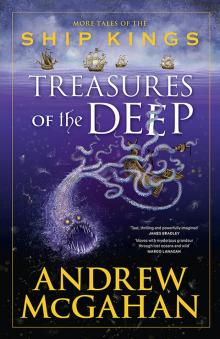 Treasures of the Deep
Treasures of the Deep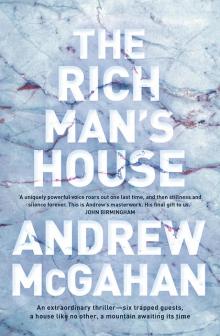 The Rich Man’s House
The Rich Man’s House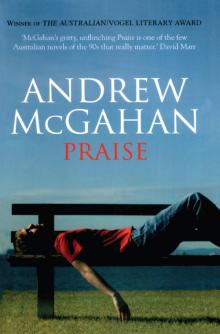 Praise
Praise The White Earth
The White Earth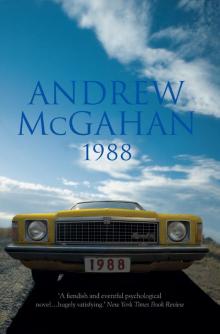 1988
1988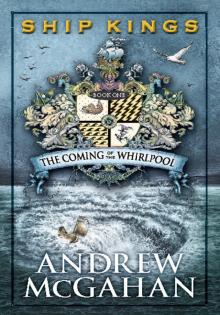 The Coming of the Whirlpool
The Coming of the Whirlpool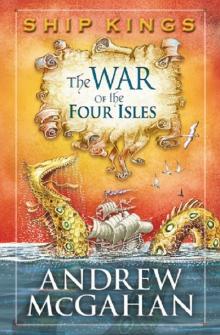 The War of the Four Isles
The War of the Four Isles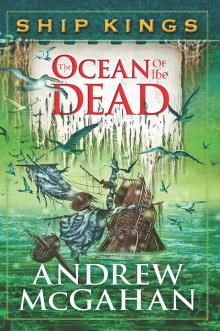 The Ocean of the Dead: Ship Kings 4
The Ocean of the Dead: Ship Kings 4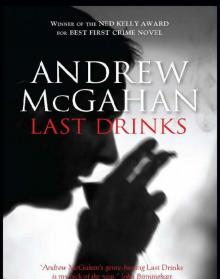 Last Drinks
Last Drinks Wonders of a Godless World
Wonders of a Godless World Underground
Underground The Voyage of the Unquiet Ice
The Voyage of the Unquiet Ice